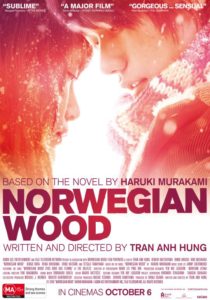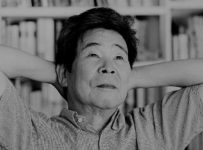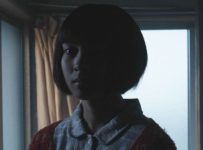[stextbox id=”grey” caption=”Norwegian Wood (2010)” float=”true” align=”right” width=”220″]
Director: Tran Anh Hung
Runtime: 133 minutes
Starring: Ken’ichi Matsuyama, Rinko Kikuchi, Kiko Mizuhara, Kengo Kora
Distributor: Curious
Country: Japan
Rating: Wait for DVD/Blu-ray (?)
[/stextbox]
The works of the beloved Japanese author Haruki Murakami have often proven to be difficult to film for two reasons. The novels are either of an intensely personal nature, with the writer’s own voice unable to be divorced from the narrative, or so surreal that trying to translate them from their native state is like trying to pick up a clock made entirely of water. The other half of the equation has been Murakami himself, fiercely protective of his work since his reported displeasure with the little-seen 1980 version of his debut novel Hear the Wind Sing. With the exception of Japanese director Jun Ichikawa’s 2005 feature version of the short story Tony Takitani, Norwegian Wood marks the first time that a filmmaker has been allowed near the writings in over three decades.
Based on the 1987 novel of the same name, in turn named for a song off The Beatles’ 1965 LP Rubber Soul, the nostalgic tale is of Toru Watanabe (Ken’ichi Matsuyama, Kamui) who recalls the troubled years he spent with the disturbed Naoko (Rinko Kikuchi, The Brothers Bloom), united by the common loss of Kizuki (Kengo Kora, Box! and the similarly themed Solanin), and torn between his love for her and the willing Midori (Kiko Mizuhara).
An often flat retelling of the tragic love story is lost in translation in its trip from page to screen. Where Murakami’s novel was tied to the cathartic process of writing and its connections with memory, director Tran Anh Hung (Scent of Green Papaya) opts for a straighter version of events. Devoid of the older Watanabe’s strong narrative voice, some questionable decisions are made by characters, and some of the supporting players – in particular the potentially hilarious Storm Trooper (Tokio Emoto, Outrage) – are sidelined. Fractured and sometimes devoid of life completely, the film deals partly with the sexual dysfunction of Naoko, and the madness that it ultimately leads her towards. Yet Norwegian Wood is a cold film, and beyond their shared connection to a dead friend, it is difficult to understand why Watanabe would have fallen for her in the first place. To continually pursue her, driving himself to the brink of insanity, is unfathomable.
Yet it is a beautiful piece to look at, with Mark Ping Bin Lee’s (New York, I Love You; In the Mood for Love) stunning cinematography shining in the distinctive Japanese seasons. Shooting on digital for the first time, Lee’s camera juxtaposes the warm interior scenes with Midori with the sterility of the awkward intimacy of the equivalent scenes with Naoko, bringing a crisp and stunningly beautiful whiteness of snow to bear on some of the most intimately tragic moments in the film. Tran speaks of film being an “old feel”, and that the digital is something that brings a contemporary feel to the film. Perhaps this is where there problem lies, in casting a very nostalgic story in a modern frame. Radiohead’s Jonny Greenwood (There Will Be Blood) adds to this feel, with his haunting pieces (coupled with a number of tunes from Krautrock band Can), and some moments of true emotional depth to the film.
[stextbox id=”custom”]A visually arresting but emotionally flat adaptation of the Murakami novel, bolstered by capable performances from the leads. Yet is the great Murakami adaptation even possible?[/stextbox]
Norwegian Wood is due for release on 6 October 2011 in Australia from Curious.





